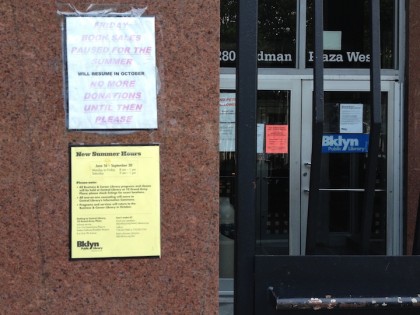So What to Do?
Given the system’s infrastructure dilemma, fundraising obstacles and years of contesting operating cuts by Mayor Michael Bloomberg’s administration, BPL’s much-debated plans to sell the Pacific and Brooklyn Heights branches adhere to a certain economic logic. But public opposition has been tenacious, forcing Ms. Johnson to pull back on previously announced plans to sell the Pacific branch.
The Library’s proposed sale of the Brooklyn Heights branch for the development of a multi-story residential tower, however, is moving forward. Located on the edge of the Brooklyn Heights Historic District—the city’s first—the BPL’s prime triangular real estate parcel on Cadman Plaza West is a justifiably prized asset. And public reaction to the sale, the interim library that is promised, the construction process and the final result may well define Ms. Johnson’s BPL tenure.
The Brooklyn Heights Blog reported last December that seven unidentified bidders had submitted plans in response to the Library’s Request for Proposals. An announcement of the winning proposal, once expected this summer, has now been put off until October, oddly enough, about the time that the results of City Comptroller Scott Stringer’s audit of all city library systems, launched in February specifically to examine how millions in public funds are spent on capital projects, may be released.
Is the sale of the Heights branch really the only viable path? “Our public libraries are vital resources for New Yorkers of all ages and backgrounds,” said Michael Nitzky, Director of Communications, Office of NYC Comptroller in response to an email about the audit. “They deserve to know that their taxpayer dollars are being spent wisely and efficiently.”
Brooklyn Borough President Eric Adams has also raised questions about BPL’s financial situation. “[W]hen you have an urgent capital need, you have to come up with a plan as to how to address that capital need. And some of the ways of doing that, how do you sell off assets you have that have a larger dollar value?”
“I need the library to open their books,” continued Adams. “Show me what’s the real capital issue…. I am looking forward to a continued conversation and a full understanding of the capital needs of the Brooklyn Public Library system.”
And tellingly, Public Advocate Leticia James is also cautious. Says James, “While I understand the Brooklyn Public Library’s pressing capital needs, I remain concerned about the sale of public library sites. Infrastructure issues can be overcome when budgets allow refocus and redistribution. But once lost, these spaces will likely never serve the public need again.”
Publisher’s Note: This is part two in a three-part series on the Brooklyn Public Library, in particular the conditions that have led to the proposed sale of the Brooklyn Heights Library branch. These articles are made possible thanks to the generous support of BHB readers who contributed to our IndieGoGo campaign.
The post has been amended with an official statement from the Brooklyn Public Library

